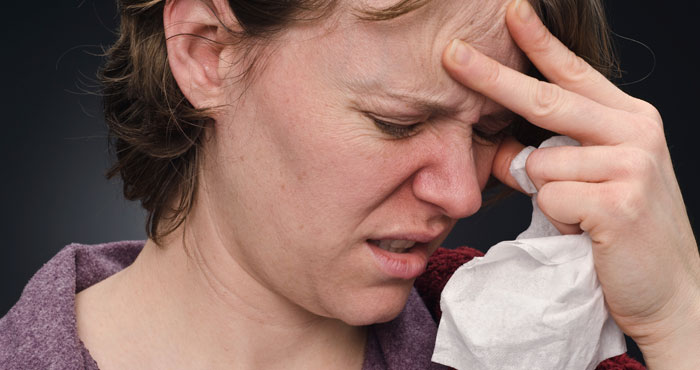Stuffy Nose or Sinus Infection (Sinusitis)?

If you’re like most people, at some point in your life, you have dejectedly uttered (or will utter) the words, “I think I have a sinus infection.” You’ll then reach for another tissue as you struggle to breathe through your nose.
More than 28 million adults are affected by sinus problems each year, and 11.7 million are diagnosed with sinusitis (the medical term for a sinus infection), according to Centers for Disease Control and Prevention (CDC) statistics.
How Do I Know If I Have Sinusitis?
W. Andy Logan, MD, an ear, nose, and throat (ENT) physician with Baptist Health Madisonville, says that when you experience sinus congestion symptoms, it’s not always easy to determine whether you have an infection or simply a cold.
In those situations, let these three questions guide you:
Is it sinusitis?
Sinusitis refers to infection, inflammation, or swelling of the nasal cavity and sinuses, a group of hollow spaces surrounding the nose and eyes. Viruses, bacteria, and fungi can cause sinusitis, and it may be classified as acute (lasting up to four weeks), recurrent (repeated), or chronic (long-lasting).
The primary symptoms of sinusitis are:
- Cloudy or colored nasal discharge
- Nasal blockage
- Pain or pressure in your forehead, between your eyes, alongside your nose, or in your upper jaw and teeth
Sinusitis may also cause:
- Fever
- Cough
- Fatigue
- Reduced or lack of sense of smell
- Ear fullness
Dr. Logan says to keep in mind that while headache and facial pain, and pressure are well-known symptoms of a sinus infection, those symptoms alone rarely indicate you have a sinus infection.
How long does a sinus infection last? That depends on many factors, with a range of 10 days to eight weeks.
What should I do if I think I have a sinus infection?
If you’ve had symptoms for fewer than ten days, you may simply have a virus. Treat symptoms with over-the-counter medications, including decongestants (ask your doctor first if you have high blood pressure or heart problems), antihistamines (if sneezing and watery drainage are predominant symptoms), and saline nasal spray (which you can use as often as needed to treat dryness or congestion). Avoid decongestant nose sprays like Afrin and Vicks, as they can be addicting.
You may also get relief by putting a warm compress over your nose and forehead to help reduce sinus pressure. Breathing steam from a bowl of hot water or in the shower may also help.
If you have symptoms for more than ten days, or if your symptoms seem to improve, then get significantly worse, you should see your doctor.
If your sinusitis is due to a cold or other viral illness, antibiotics won’t make you better. If your sinus infection is caused by bacteria, antibiotics may help but may not be necessary for you to beat your sinus infection. In many instances, a doctor will recommend “watchful waiting” to determine whether treatment is needed.
If symptoms occur repeatedly or persist for months, your doctor may refer you to a specialist for further evaluation.
How can I avoid getting sinus infections?
Some people are more prone to sinus infections than others. If you find that you have frequent sinus problems, you can reduce your risk by taking these actions:
- Be proactive about avoiding viral illnesses. That includes getting a flu shot, practicing good hand washing, keeping your home clean, and not touching your face. You should also avoid unnecessary contact with people you know are sick.
- Don’t smoke and avoid secondhand smoke. Cigarette smoke is a chronic irritant of nasal passages and can trigger allergies that lead to sinus infections.
- Address your allergies. Allergy flare-ups increase your risk of developing sinus infections. As much as possible, eliminate allergens like dust or mold from your home, office workspace, etc. You should also ask your doctor if you should take regular allergy medication or see an allergy specialist to control your condition more effectively.
- Use a humidifier at home. Moistening the air can reduce irritation and inflammation in the sinuses and airways.
- Maintain a healthy lifestyle. Exercising regularly, eating a healthy diet, and getting plenty of sleep are good ways to support your immune system and enable it to fight infections effectively.
- Consider surgery if appropriate. Surgery to remove sinus blockages or to enlarge narrow sinus openings can help people with severe sinus problems avoid sinusitis.
Get Help with Sinus Infections from Baptist Health
Your doctor can help you determine whether letting a sinus infection run its course or treating it is appropriate in your case. And if you struggle with frequent or long-lasting sinus infections, they can talk with you about your treatment options.
If you experience significant sinus infection symptoms when your doctor is unavailable, you can seek a diagnosis or treatment at a Baptist Health Urgent Care Clinic.
Next Steps and Useful Resources
How Long Does a Sinus Infection Last?
Sinus Infection or COVID-19? How to Tell the Difference.
Tips to Avoid the Flu
Safe Neti Pot Use Tips



